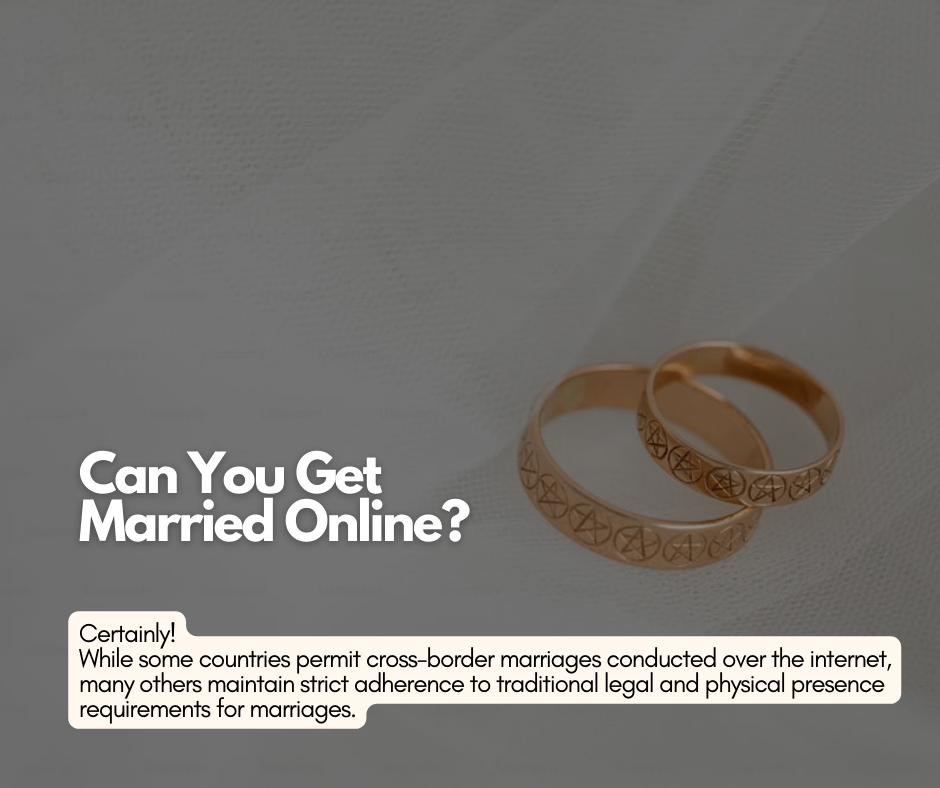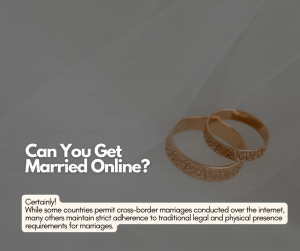In our modern digital age, the boundaries of what can be accomplished online seem to continuously expand. From shopping to education, many aspects of life have moved into the digital realm. But what about the sacred institution of marriage? Can you get married online?
Understanding the Concept:
Marriage is a legally binding contract that involves a series of legal formalities, traditionally conducted in person, involving the exchange of vows, signing of documents, and often officiated by an authorized individual, such as a minister, priest, or magistrate.
With the rise of technology, the notion of getting married online has sparked curiosity and raised numerous questions.
Online Ceremonies: Fact or Fiction?
The concept of online marriages can vary significantly based on geographical locations and legal jurisdictions. In some areas, online ceremonies might hold validity, while in others, they could be considered invalid or unenforceable. It’s crucial to delve into the specifics of the law in your region before considering an online marriage.
ALSO READ: Importance Of Courtship: Social and Moral Responsibilities of Bachelors And Spinsters In Courtship
Legality and Validity:
The legality of online marriages hinges on several factors. For instance, some jurisdictions might accept marriages conducted virtually if both parties are physically present in different locations but participate in a ceremony conducted by an authorized officiant via video conferencing tools.
However, many regions have strict requirements for marriages, mandating physical presence during the ceremony and the signing of official documents in the presence of witnesses and an authorized individual. As such, marrying entirely online might not comply with these legal prerequisites.
Practical Considerations:
While the idea of saying “I do” via Zoom or Skype may seem convenient, practical considerations often arise. Factors like the legality of the marriage, recognition in other jurisdictions, and the necessity of physical presence for certain legal formalities cannot be overlooked.
Additionally, cultural and emotional aspects of marriage, such as the shared experience of a physical ceremony, exchanging rings, and celebrating with loved ones, might be diminished in an online-only setting.
The Future of Online Marriages:
As technology continues to advance, legislation might evolve to accommodate the changing landscape. The current limitations and restrictions on online marriages might undergo revision or adaptation to suit the needs of a digitally connected society.
While the concept of getting married online might seem enticing in our tech-savvy world, the legal and practical aspects remain complex and variable. It’s essential to understand the laws and requirements of your jurisdiction before considering an online marriage. As of now, many regions require physical presence and adherence to specific legal formalities for a marriage to be considered valid.
Remember, the sanctity and legality of marriage are deeply rooted in societal and legal norms, and while the internet has revolutionized many aspects of life, the institution of marriage remains bound by traditional legal frameworks.
ALSO READ: 11 Reasons Why People Generally Prefer Honor and Prestige Over Servanthood
Can You Get Married to Someone from Another Country: Legalities and Practicalities
In a world interconnected by technology and travel, the prospect of marrying someone from another country presents both opportunities and challenges. The question arises: Can you legally and practically get married to someone from a different country?
Understanding Cross-Border Marriages:
Marriage, a legally binding contract, varies in its execution and recognition across international borders. The feasibility of marrying someone from another country involves a myriad of legal, logistical, and cultural considerations.
Legal Implications:
The legal implications of marrying someone from another country are multifaceted. Many nations have distinct requirements and regulations for marriage, such as residency, documentation, and eligibility criteria. Understanding the legal requisites of both your country and your partner’s is crucial.
Legal Recognition:
Marriages conducted in one country might not necessarily be recognized as valid in another. Some nations have treaties or agreements recognizing marriages performed in other countries, while others might require additional paperwork or ceremonies to validate the marriage locally.
Practical Considerations:
Beyond the legalities, practical aspects also demand attention. Language barriers, cultural differences, and logistical challenges, including visa requirements and immigration laws, significantly impact the feasibility and process of marrying someone from another country.
Technology’s Role:
The digital era has facilitated communication and bridged distances, allowing couples from different countries to maintain relationships. However, when it comes to the legalities of marriage, physical presence, and adherence to specific legal procedures in the respective countries often remain mandatory.
Countries Who Accepts Online Marriage
Though countries like the United States accept online marriage, Countries like France, Canada, Australia, and the United Kingdom deny online marriage.
Can You Get Married Online?
Yes! While some countries permit cross-border marriages conducted over the internet, many others maintain strict adherence to traditional legal and physical presence requirements for marriages.
ALSO READ: 11 Subtle Ways to Get Your Husband On Your Side
Future Prospects:
As the world evolves, international marriages might witness changes in legislation and international agreements, potentially simplifying the process and recognition of cross-border unions. Advocacy for streamlined processes for cross-border marriages continues to gain traction.
Conclusion:
Marrying someone from another country entails navigating a complex web of legal, logistical, and cultural intricacies. Understanding and complying with the legal requirements of both countries involved is paramount to ensure the marriage’s validity and recognition.
While technology and globalization have facilitated international relationships, the legal facets of marriage continue to be rooted in specific jurisdictional frameworks. As such, the feasibility and recognition of marrying someone from another country necessitate careful consideration and adherence to legal procedures.

